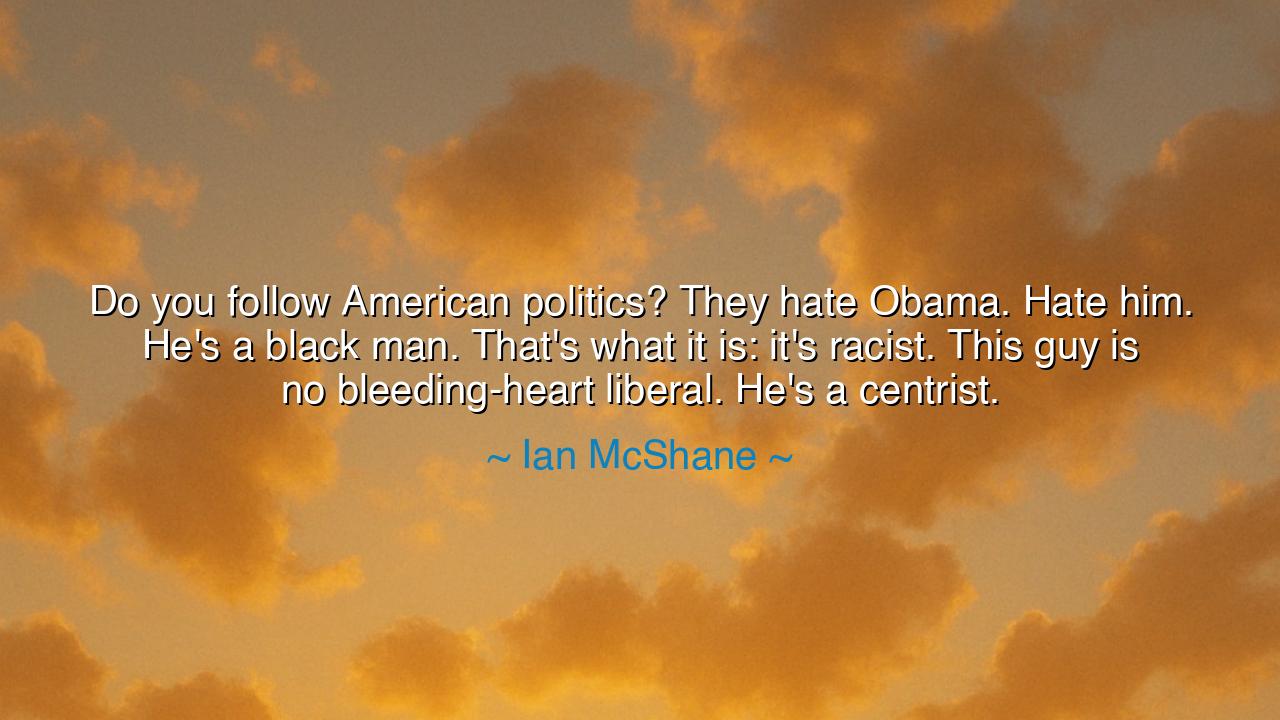
Do you follow American politics? They hate Obama. Hate him. He's
Do you follow American politics? They hate Obama. Hate him. He's a black man. That's what it is: it's racist. This guy is no bleeding-heart liberal. He's a centrist.






In the words of Ian McShane, “Do you follow American politics? They hate Obama. Hate him. He’s a black man. That’s what it is: it’s racist. This guy is no bleeding-heart liberal. He’s a centrist.” we hear not the polished speech of a statesman, but the raw voice of an observer who has stripped away pretense. McShane speaks as one who sees through the veil of rhetoric, identifying that the hostility toward Barack Obama was not simply born of policy disagreements, but of something more ancient and poisonous: the enduring shadow of racism. His words burn with both frustration and clarity, a reminder that prejudice often masquerades as political opposition.
The origin of this statement rests in the tumult of Obama’s presidency. Elected in 2008 as the first Black president of the United States, Obama came into office with promises of unity and reform. Yet almost immediately, he was met with unprecedented obstruction and venom. Movements such as the “birther” conspiracy questioned his citizenship, pundits labeled him a radical, and opponents painted him as an alien force in his own land. And yet, as McShane notes, Obama was not a revolutionary firebrand. His policies were moderate, cautious, even centrist—the Affordable Care Act, financial reforms, and foreign policy initiatives sought balance rather than upheaval. The fury against him, then, could not be explained by ideology alone.
History reveals that this is not new. Whenever marginalized peoples rise into positions of authority, backlash erupts. Consider the era after the American Civil War, when formerly enslaved men briefly held public office in the Reconstruction South. Their presence in power ignited a furious resistance, birthing groups like the Ku Klux Klan, whose violence was justified not by reasoned political argument, but by naked racism. What McShane identifies in Obama’s era is the continuation of this same tragic pattern: the fear of a changing order, and the refusal of some to accept equality when embodied in leadership.
The deeper meaning of McShane’s words lies in the unmasking of illusion. Too often, political discourse cloaks itself in lofty terms: debates about taxes, healthcare, government spending. But beneath the surface, darker forces sometimes guide the hand. McShane dares to say aloud what many knew but hesitated to confront—that the intensity of the hatred was not about policies, but about the person, about his identity as a Black man in the highest office of the land. To name this truth is uncomfortable, but necessary, for silence allows prejudice to hide in shadows.
Yet McShane also reminds us of a paradox: Obama was no “bleeding-heart liberal,” no radical eager to overturn the system. He was pragmatic, deliberate, willing to compromise. In other words, he was what democracies often claim to admire—a centrist seeking balance. That such a man became the target of such disproportionate hatred reveals that the opposition was never truly about his ideas, but about what he represented. The rage was less against his policies than against his presence.
The lesson for us, O listener, is grave but vital. Whenever you hear voices of fury against a leader, do not take every word at face value. Ask yourself: is this anger born of principle, or of prejudice? Is this critique about policy, or about identity? The ancients knew that hatred often disguises itself in noble-sounding arguments, but beneath the disguise lies fear—fear of losing privilege, fear of equality, fear of change. To see clearly, one must learn to pierce through appearances and recognize the root.
And as for practical action: confront racism wherever you see it, whether it cloaks itself in political speech or in daily life. Do not let discussions of policy become excuses for prejudice. Defend moderation and fairness when they are slandered as radical. Support leaders not based on the color of their skin, but on the justice of their actions. And above all, guard your own heart from the poison of hate, lest you too become blind to truth.
Thus, Ian McShane’s words endure as a mirror. They reflect a society still wrestling with its oldest demons, even amidst its modern achievements. His voice is a call to honesty, to strip away excuses and face prejudice for what it is. Politics may wear many masks, but truth unmasks them. And only when we name injustice for what it truly is can we begin the work of healing.






AAdministratorAdministrator
Welcome, honored guests. Please leave a comment, we will respond soon